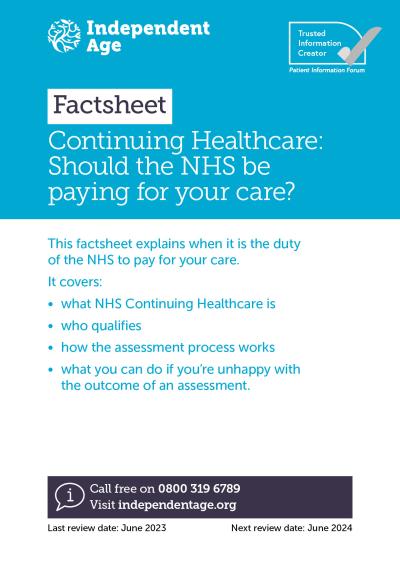Related publications

If you have complex health and care needs and live in England or Wales, the NHS might need to pay for your care outside hospital. This could be in your home or in a care home.
NHS Continuing Healthcare is not available in Scotland. It has been replaced by Hospital Based Complex Clinical Care. You’ll only qualify for this if your care needs must be met in a hospital. Visit Care Information Scotland to find out more.
Outside of hospital, personal and nursing care is free in Scotland to anyone who has been assessed as needing it. Visit the Scottish Government page Free personal and nursing care: questions and answers for more information.
NHS Continuing Healthcare is care that's arranged and paid for by the NHS. It covers personal care, health care, and care home fees, including food and accommodation.
If you qualify, your care will be free. The NHS will not look at your finances to see if you need to pay towards the costs.
To get NHS Continuing Healthcare, you must have an assessment by health and care professionals. People who can get it:
There’s no list of conditions that mean you’ll automatically get NHS Continuing Healthcare. The assessment looks at your personal situation.
Your local Integrated Care Board (ICB) in England or Local Health Board (LHB) in Wales are responsible for health services in your area. They must make sure you’re assessed if you seem to need NHS Continuing Healthcare.
If you think you should have an NHS Continuing Healthcare assessment, you can ask a nurse, doctor, GP or social worker to arrange one. You can also contact the NHS Continuing Healthcare team at your local ICB or LHB yourself to ask for an assessment.
If you live in Scotland
NHS Continuing Healthcare is not available in Scotland. It has been replaced by Hospital Based Complex Clinical Care. You’ll only qualify for this if your care needs must be met in a hospital. Visit Care Information Scotland to find out more.
The first step is usually a screening assessment using the Checklist Tool. Your health or care professionals use this document to decide if you qualify for a full assessment.
There are two possible outcomes:
• a positive Checklist – this means that you may have a primary health need and you must have a full assessment by a multidisciplinary team. They will then decide if you qualify for NHS Continuing Healthcare, using the Decision Support Tool (DST)
• a negative Checklist – this means that you do not meet the criteria for a full assessment.
When you have an assessment, health and care professionals will look at:
You should be fully involved in this process. You can have a representative with you to make sure that your views are taken into account. This could be a family member, friend, carer or advocate.
Fast-track assessments
If you have a primary health need because of a condition that is quickly getting worse and may be entering its final stages, you may be able to have a fast-track assessment. This assessment process is quicker and doesn’t use the Checklist Tool or DST.
If you get NHS Continuing Healthcare, your ICB or LHB will regularly review your health and care needs. This will happen no later than three months after you first qualify, and at least once a year after that, to make sure you’re still getting the right care. If your condition changes, you may find you no longer qualify for NHS Continuing Healthcare. This can only happen if:
If you’re turned down for NHS Continuing Healthcare after a full assessment, you have the right to ask for the decision to be reviewed. For more information, read our factsheet Continuing Healthcare: Should the NHS be paying for your care? or call our Helpline on 0800 319 6789 to arrange to speak to an adviser.
If you can’t get NHS Continuing Healthcare, you may qualify for NHS-funded nursing care. You can get this if:
If you’ve had a full NHS Continuing Healthcare assessment, this should provide enough information to decide if you can get NHS-funded nursing care.
If you qualify, you’ll get £219.71 a week (2023/24 rate) in England and £201.74 a week (2022/23 rate) in Wales towards the nursing part of your care home fees. If you pay your own fees, this money is normally paid directly to the nursing home. This could reduce your overall care home fee (depending on your contract with the home). If the council pays for your care, the funding will go straight to them.

For more information about who can get NHS Continuing Healthcare and how the assessment works, read our factsheet Continuing Healthcare: Should the NHS be paying for your care? or call our Helpline on 0800 319 6789 to arrange to speak to an adviser.
If you want to ask for an assessment, speak to the health and care professionals involved in your care and treatment. You can also contact the NHS Continuing Healthcare team at your local Integrated Care Board in England or your Local Health Board in Wales.